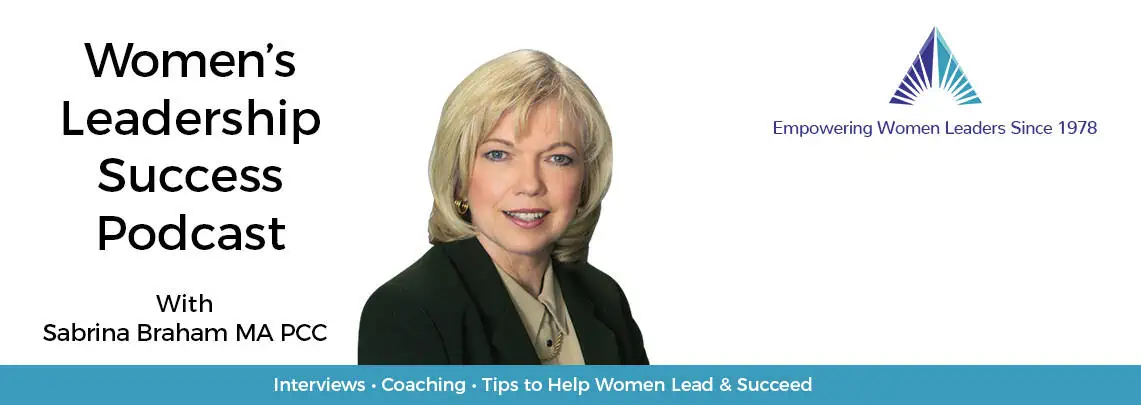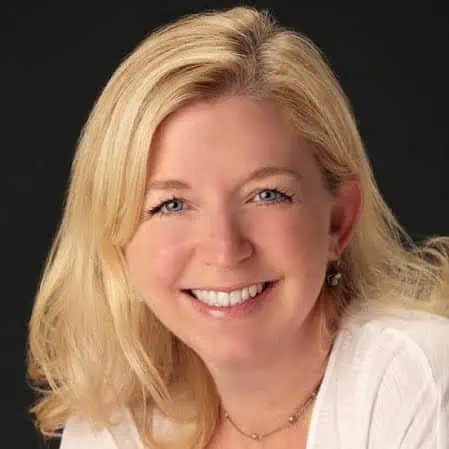This is WomensLeadershipSuccess.com radio, Episode number 7, “How to Deal with the Demands of Being a Single Parent.” Be sure and listen for a simple request at the end of the show that will help women worldwide attain promotions and excel in leadership positions.
Welcome to Women’s Leadership Podcast, showing you how to influence people, improve your performance, and advance your career. Brought to you by women’s leadership and career expert Sabrina Braham and WomensLeadershipSuccess.com. Here’s your chance to meet women trendsetters leading the way to success, accomplishment, and balance in business and life, no matter if you’re a manager, CEO, or entrepreneur. Join Sabrina for coaching and no-nonsense advice to improve your career and bottom line.
_____________________________
Sabrina Braham: This is Sabrina Braham with Women’s Leadership Success and today we’re talking to Teresa Jackson who is the Vice President and Regional Underwriting Manager for Homecoming Savings, a GMAC company. Welcome, Teresa.
Teresa Jackson: Thank you, Sabrina.
Sabrina Braham: Tell us a little bit about what you do.
Teresa Jackson: Well, I’ve been in the mortgage industry for 21 years and recently, really over the past 10 to 12 years, I have been in the underwriting world of mortgage banking. Right now I’m a Regional Underwriting Manager for Homecomings Financial and really am responsible for the quality of underwriting for the Western half of the United States.
Sabrina Braham: Wow. Sounds like you have a lot on your plate.
Teresa Jackson: Very business, especially during this time in our economy and in this industry.
Sabrina Braham: Right. What led you into the mortgage business?
Teresa Jackson: Well, that’s a funny question. Few people actually choose the mortgage business. It chooses them more oftentimes than not. I actually started off with a degree in Community Health Education, with an emphasis on Women’s Health. That’s really where my passion is, is helping people. And in my early 20s I was very much interested in helping teenagers, especially teenage girls, with regard to choices around health-related issues. However, during that time there weren’t a lot of jobs available; a lot of the federally funded programs had been cut.
So I tried different industries and actually ended up relocating to the North Bay and started off as a temp worker for a mortgage company. And that was really what started my career. I ended up being with that company for 16 years and really found that through my passion for helping people I was able to take that passion and turn it into mortgage lending, most specifically by really helping people to reach their dream of owning a home.
Over the years I’ve worked significantly with government agencies providing down payment assistance to first time homebuyers and low to moderate income families. And I will tell you it’s just such a joy to see these families when they’re able to get into homes. Over the years I’ve had an opportunity to see people who are involved with sweat equity — actually on the weekends after working their 40 and 50 hour a week jobs — on the weekends on site helping to build their homes.
In fact, I was involved with a local housing authority that ended up giving awards to various people that had helped these local families get into homes and it was just — I felt so proud to be a part of what the company that I worked for and what the community had done for these families who are low to moderate income — definitely challenged with regard to income — and able to help them realize their dream. So really my passion about helping people I’ve been able to make work through my career in mortgage banking.
Sabrina Braham: Well, that’s fantastic. And also it sounds like that passion has helped you move up in your career.
Teresa Jackson: Oh, absolutely.
Sabrina Braham: Yeah. It really makes a lot of sense. We had talked before about you being a single parent; and I, too, had that experience and there’s some real challenges with being a single parent. And I wondered if we could talk a little bit about that. First off, how has your role as a mother helped you to be successful?
Teresa Jackson: Well, I think first and foremost it has given me the ability to really be compassionate for other men and women I work with in terms of the challenges that they face in being a parent. As a parent I deal with the same things that everyone else does, sick children, just challenges in life; yet you have a commitment to the company you work for. And I think being compassionate for those that you work with or who work for you gives you the opportunity to be open-minded and understanding.
And really if you strive towards common goals in the workplace, while being compassionate to the needs of people who deal with the same family challenges — whether it’s children or elderly parents — it can really create a win-win situation for the individual as an employee and for the company. And I really believe that as a mother I was able to find that compassion.
Sabrina Braham: Right. I just worked for a company where the owner didn’t allow any of the people to take Saturday off. And all these people had kids in Little League and soccer and ice hockey and it really was affecting morale.
Teresa Jackson: It is tough because there’s baseball season and soccer season, schools tend to have holidays that are not federal holidays that allow employees to be off work, and there’s a lot of times where daycare will close and so the parent is basically stuck. If they don’t have a support system to help out and watch their children it can be a very precarious situation for them.
And so really I think being flexible as a professional in working with employees, again it creates a win-win situation where everyone can be successful.
Sabrina Braham: Well, I’m really interested in how you personally have dealt with being a parent and doing the professional role. You just said something about the importance of having a support system, and what I find is a lot of times single parents don’t even think about that. They’re thinking, “I’ve got to do this all myself.” Can you talk a little bit about the support system that has helped you with your children?
Teresa Jackson: Sure. I believe that a support system comes in many different ways. It’s not just friends or family; it can be colleagues, your partner in life, really you have to be open-minded to looking at everyone who’s out there that you interact with. And support systems in my opinion can be more than just for personal support, but for professional support as well, or support in your relationships.
Sabrina Braham: Can you talk about that? How can that spill over into professional support?
Teresa Jackson: Well, if you are struggling personally and have a support system to help you out — whether it be friends or family, and talking and communicating — if you can keep a balance in your personal life I believe that helps you to be successful in your professional life. There’s just no way if somebody’s struggling in their personal life that some of that isn’t going to seep into their professional life.
And really vice versa. If you’re having a really challenging time at work or in your profession, certainly we’re all human; that’s going to filter into your personal life. So I believe that it’s important to take time for yourself, recognize — and I think for women we really want to do it all. It’s hard for us to ask for help. And I think the most important thing we can do is recognize that we can’t do it all and there are people out there that are willing to support us. And so to take advantage of that, be willing to ask for help, is one of the things that’s really helped me to be successful.
Sabrina Braham: And professionally the importance of doing that.
Teresa Jackson: Absolutely. And professionally. The only way that you can grow — or one of the ways that you can grow — is by seeking out mentors, asking people questions. How have they been successful? Whether this is professional or personal do you see people, meet people in your life that you view as successful in whatever they do? It’s important to ask them, “How did you get there? What were some of the challenges that you faced? How did you overcome them?”
If you look at life as just a constant learning, it gives you an opportunity to improve your life both personally and professionally if you’re constantly seeking new things.
Sabrina Braham: That’s so important. And what I’ve found is that’s also a good way to tell who will be helpful to you, because if you start asking questions and the person doesn’t give you good answers you know that that probably isn’t a good person to help you or be a mentor.
Teresa Jackson: Absolutely.
Sabrina Braham: And some people are very, very generous with their time and ideas and those are the people that can really help you move ahead, both professionally and in your private life.
Teresa Jackson: Exactly.
Sabrina Braham: So what personal challenges have you faced in balancing your role as a mother, an employee, a mentor, a friend, a partner?
Teresa Jackson: Well, I’ll tell you, there’s just never enough time. There are many times throughout the week where I think 24 hours just isn’t enough time in a day; but the truth is, we only have 24 hours. So I like to prioritize in my mind what is important, and first of all I think the most important thing is taking care of yourself. If you don’t take care of yourself it’s really difficult to take care of your family and be successful in your professional life.
And I do a variety of things to take care of myself. And being extremely busy one of the things I do is I take my 30-minute drive to and from work — I use that as an opportunity to grow personally and professionally through listening to audio books, self-improvement. If I’m having an especially stressful day I’ll listen to a tape that helps me to unwind. So I really try to take that time and make it productive.
I also will get up early in the morning or retire to bed early at night so that I can have just that personal time to myself to either do journaling, reading of books, things that are for me that I enjoy doing that really doesn’t take away from either my personal time with my children or my friends or my partner or with work.
I also have been very actively, over my life, involved in creating support systems for myself and my children and I do that through friends, relatives, colleagues. And all of that combined really helps me take care of myself, whether it’s exercise, eating right, that kind of thing.
Sabrina Braham: I’ve also found that scheduling taking care of yourself can be good. Actually putting it in your appointment calendar as something you’re doing, whether it’s going to the gym or meditating or just having half an hour where you’re doing nothing.
Teresa Jackson: Absolutely. For me, if I don’t schedule the time it seems that I don’t take the time to actually take care of myself. I think that’s probably one of the first thing that we as mothers do is give up our personal time to take care of everything else.
Sabrina Braham: I love what you’re saying. And also giving our children that time is so important. And you told me a story that I’d love for you to repeat about your son missing the school bus?
Teresa Jackson: Yes. For my job I actually travel quite a bit; I’m gone 25 to 40 percent of the time. And I happened to be down in Southern California at one of our branches. And it was early in the morning — it was a little bit after 8:00 — and I was in the training room for this particular branch getting ready to do a presentation and my cell phone rang.
And I picked up the phone and my son goes, “Mom, this is Ian. I’ve missed the bus. What do I do?” I thought it was so cute, yet ironic, that here I was 500 miles away and the first person he thought to call was me, that I would solve his problem for him of missing the bus and now what am I going to do?
And I think really the moral of that story for me is that I have always been available for my children. I have not let my professional career take away from the importance of being there as a mother for my children. So no matter where I am — the invention of the cell phone is a beautiful thing. Both my kids have cell phones and they can call me anytime, no matter where it is. Whether I’m in Southern California, on the East Coast, it doesn’t really matter.
I think for me and for them, being available to them just really adds to our relationship as parent and child; and also helps them to understand, too, that you can be successful. I try to be a good role model to them, “You can be successful in your profession and still be a parent, still be there available for your children.”
Sabrina Braham: One of the studies says that parents tend to spend less than five minutes a day talking about anything besides what the kids have to do. And what we found is that if you spend five minutes a day talking, connecting with your child, that it really changes things. And what I hear you saying is that you’ve made a real commitment to spend some quality time with your kids on a regular basis.
Teresa Jackson: Absolutely. And you can do that in a variety of ways. Every day after school my kids call me. Now, they’re both teenagers now, but even so every day after school I get the phone call. “How was your day?” is what I hear from them. So they want to hear how I’m doing. And then I get to hear — they tell me about what happened in their day.
And sometimes they’re just grunting because teenagers tend to do that. I’ll say, “How was your day?”
“Oh, it was okay.”
Or they might have an exciting story to tell me. So just keeping that communication going.
One of the other things I do is from time to time I’ll just take a day off during the week and I will spend it with one of them individually. As an example, last week I took the day off and I told my daughter, “Okay, this is your day. What would you like to do?” And so we ended up going down to San Francisco and spent the day shopping and lunch and what not. So the time was really focused more on her and I and what does she want to do, as opposed to the mother-child relationship and making sure she’s getting her homework done or her room is clean, or did she do all the things that she’s committed to doing?
Sabrina Braham: She must have loved that.
Teresa Jackson: Oh, she did. The next day, in fact, I was at work and I received a text message from her saying, “Thank you so much, Mom. I had a great time yesterday.” And to receive something like that from your child really warms my heart as a mother.
Sabrina Braham: Oh, that’s so fantastic. We’re just about at the end of our talk here and I’m wondering if you could share a tip for success with single parents. What would you suggest for them being successful in their careers and with their families?
Teresa Jackson: I’ll tell you, at the end of every day I review my calendar for — and this is my business day — I review my calendar for the following day and the week. I also have my personal calendar online that sends me reminder notices. So I’ll get an e-mail that says what I’ve got coming up. This helps me to stay organized so I make sure that I always have time outside of work for my children, and also really very importantly my partner, because we’re a unit and it’s important to stay focused and committed to that relationship as well.
Sabrina Braham: Wow, that’s great, great advice. And what about a tip for reducing stress?
Teresa Jackson: Well, as I said earlier, for reducing stress really you have to take time for yourself. Scheduling, as you said, every day I think is a great idea. I don’t actually put it on my calendar; mine is more of a mental schedule and I’m now in a routine so I know that every day I have — I’ve always got something planned in terms of stress reduction. It could be coming home from work and changing my clothes and sitting down and decompressing with my kids for half an hour, or just totally removing myself from a stressful situation and going for a walk. Journaling also helps out a great deal.
But I think most important is being appreciative of what you have and being thankful. I have found that when I’m in a stressful situation if I immediately start thinking about what in my life I appreciate and what I’m thankful for, it takes away that stress.
Sabrina Braham: Wow. That’s really so great. And the thing that I’ve gotten from talking to you is that you really have a commitment to being happy and joyful and passionate in every aspect of your life. And that commitment, that intention, has really had great results for you.
Teresa Jackson: Thank you. Yes, I would agree. It’s important for me both professionally and personally, my relationships with my children, colleagues, friends, and I actively strive to make those successful.
Sabrina Braham: Great. Thank you so much, Teresa Jackson, for joining us today. And this is Sabrina Braham with Women’s Leadership Success. We’ll see you next week.
Attention women: Women worldwide need your assistance. You can help in less than three minutes by filling out the survey on WomensLeadershipSuccess.com. This will help me laser in on the mentors to interview to help you and many other women attain promotions and excel in leadership positions. Go to WomensLeadershipSuccess.com right now and click on the survey in the upper right-hand corner. Thank you so much for your help, for listening, and telling others about my show.
_______________________________
Thank you for joining your host, Sabrina Braham, on another Women’s Leadership podcast. If you have questions or comments you can e-mail her at Sabrina@SabrinaBraham.com. Since 1989 Sabrina and her team have helped hundreds of women managers, business leaders, and entrepreneurs with valuable trainings, articles, books, and executive coaching. For additional tips, interviews, and free access to “Great Leaders Today” mini-course, visit www.WomensLeadershipSuccess.com.










